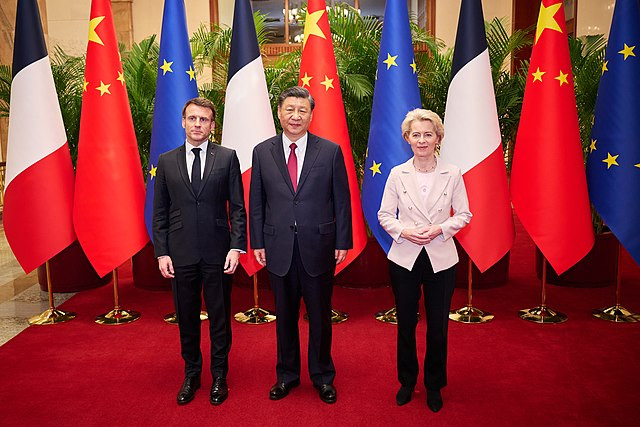On June 12, the European Commission announced a preliminary decision to impose temporary anti-subsidy duties on electric vehicles imported from China. This move has sparked significant discontent among Chinese industry, leading to calls for reciprocal measures against the EU.
According to industry insiders, China is considering raising provisional tariffs on large-displacement gasoline cars imported from the EU. Earlier this year, the Ministry of Commerce initiated an anti-dumping investigation on brandy imports from the EU. Experts familiar with the case expect preliminary findings by the end of August.
Chinese officials from the Ministry of Foreign Affairs, the National Development and Reform Commission, and the Ministry of Commerce expressed that China will closely monitor the EU's subsequent actions and take necessary measures to firmly defend the legitimate rights and interests of Chinese enterprises.
Industry experts argue that China's strong opposition to the EU's actions has a clear and solid legal basis. Sun Xiaohong, Secretary General of the Automotive Internationalization Committee of the China Chamber of Commerce for Import and Export of Machinery and Electronic Products, emphasized the irrational nature of the EU's investigation. Typically, such investigations are initiated by industry stakeholders who directly feel threatened by competitive products. However, the European Commission initiated this investigation based on its subjective judgment of a perceived threat from China's electric vehicle industry, a rare occurrence in history.
The investigation process also lacked fairness, objectivity, and transparency, according to the China Chamber of Commerce for Import and Export of Machinery and Electronic Products. The EU selected three Chinese companies-SAIC, Geely, and BYD-for the investigation without providing a compelling rationale for their selection.
Hao Jie, a researcher at the National Development and Reform Commission's Institute of Foreign Economic Research, noted that the EU disregarded World Trade Organization (WTO) rules by exaggerating subsidy projects to meet predetermined goals. The EU excluded European and American companies with significant export volumes from the sample, only including Chinese domestic companies, which resulted in an unfair and non-transparent process.
The preliminary decision indicated that the EU would impose anti-subsidy duties ranging from 17.4% to 38.1% on the three Chinese carmakers. This decision was reached without addressing China's concerns or responses during the investigation process, according to Sun Xiaohong.
Facing such actions, China is considering reciprocal measures. Industry insiders reveal that China is advancing procedures to raise provisional tariffs on large-displacement gasoline cars imported from the EU. The China Passenger Car Association calculated that the total value of passenger cars with engines larger than 2.5 liters exported from Europe to China annually reaches $18 billion, exceeding the value of Chinese electric vehicle exports to Europe in 2023.
In addition to the automotive sector, China is expected to announce preliminary findings on the anti-dumping investigation of EU-origin brandy imports by the end of August. This investigation, initiated by the China Alcoholic Drinks Association, underscores the importance of the Chinese market to the European brandy industry. Last year, EU brandy exports to China increased by more than 20% from January to September, despite a decline in global sales.
Cui Fan, an international trade expert at the University of International Business and Economics, mentioned that both China and the EU are WTO members and can address disputes through the WTO's dispute resolution mechanism.
Zhang Monan, an expert from the China Center for International Economic Exchanges, who recently visited Europe, observed that European countries are concerned about potential Chinese retaliatory measures if the EU proceeds with the tariffs. She noted that the preliminary decision allows for objections from Chinese enterprises and EU member states until July 4.
Germany, Hungary, and Sweden have already expressed opposition to the EU's decision, highlighting the collaborative relationship between these countries and China in the electric vehicle sector. BMW Chairman Oliver Zipse stated that imposing tariffs would hinder European carmakers' development and harm European interests, leading to a tit-for-tat response and replacing cooperation with isolation.
In a globalized world, comparative advantages enable countries to achieve better development. The Chinese and European automotive industries, despite their competition, have significant room for cooperation. Strengthened cooperation in the electric vehicle sector benefits Europe in tackling climate change and advancing its green transition.
The European Transport and Environment Association noted that 19.5% of electric vehicles sold in Europe in 2023 were made in China, contributing to significant carbon emission reductions. The EU's decision to impose tariffs not only hinders its automotive industry's transition but also damages its reputation as a leader in green transformation.
Chinese officials reiterated that mutually beneficial cooperation is essential for both sides. They emphasized that China supports fair competition in the automotive industry and aims to maintain a stable global automotive supply chain. However, if the EU insists on imposing tariffs that undermine the basis of Sino-European automotive cooperation, China will take all necessary measures to protect the legitimate rights of Chinese enterprises.
The EU still has time to reconsider and choose a path of mutual benefit over detrimental protectionism.






